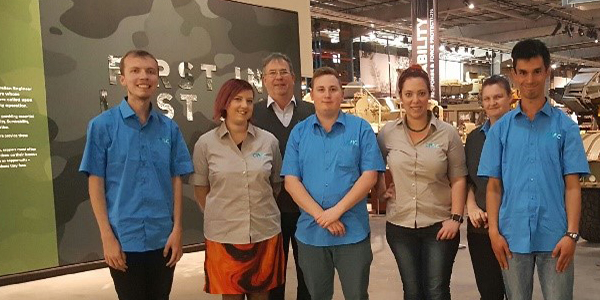
In 2016, Civic was selected as the NSW provider for the Defence Administrative Assistance Program (DAAP) at Holsworthy Army Barracks.
The DAAP program provides people with disability the opportunity for employment in the Department of Defence, with the team completing administration work for Defence departments including shredding, document collation, and other administrative tasks. While the program offers important opportunities for ongoing, mainstream employment for people with disabilities, it also allows the Army the privilege of experiencing a truly inclusive workplace.
“Not everyone has had previous experience with disabilities and the opportunities to meet and work alongside our DAAP Team have provided a better understanding of true inclusiveness and diversity,” says one Manager from the Australian Defence Force.
Based at Holsworthy army base in South West Sydney, the Civic DAAP team have been employed for five years now, with the program playing an important role in the lives of many staff. Over the past five years, 14 supported employees and six staff have been part of the DAAP program, providing approximately 35,000 hours of administrative work to the Department of Defence.
Based at Holsworthy army base in South West Sydney, the Civic DAAP team have been employed for five years now, with the program playing an important role in the lives of many staff.
Kyle, who has been part of the program since the beginning, recently shared how much the employment means to him.
“I’ve been part of the DAAP team since October 2016 and I work at Holsworthy two days a week. I enjoy coming to work at Holsworthy and being part of the team and I am proud of the work I do there,” he says.
“Over the years I have learnt new skills and my confidence has grown. Once our team were asked to work at the Defence Plaza in the city, which was exciting.’”
CEO Annie Doyle says the DAAP program has had a positive effect on all those employed, providing them the opportunity to experience exciting new environment, develop their skills and expand their personal networks.
“It’s a major confidence boost to the individuals in the Civic DAAP team and it has been incredibly beneficial and rewarding for them and their families. It allows them to see new possibilities and realise their potential,” says Annie.
DAAP employee, Aaron, who works at Holsworthy two days a week says he enjoys the work, that he feels appreciated, part of the team and has developed friendships.
“I enjoy my job and look forward to working there two days a week. I find the work interesting and challenging and would like to learn more skills and jobs, like working on the computers,” says Aaron.
“My Mum is also proud that I am working at Holsworthy. I have come a long way since I have worked there. My confidence and independence has grown, and I like communicating with new people.”
Civic’s partnership with DAAP is just one example of the important work of Civic Crew in addressing the employment challenges experienced by Australians with disability.
Currently, the labour force participation rate for people of working age with disability is 53% – compared to 84% of people without disability. The impact of low economic participation on the wellbeing of the individual is significant – while employment offers economic security, it can also affect wider standard of living, improving self-worth and have broader impacts on the person’s family and their community. Similarly, improving the employment opportunities for those with disability can have benefits for the employer and Australian Economy, with organisations with leading disability initiatives reporting 28% higher revenue and 30% higher profit margins.
While there are many benefits to increasing economic participation, there are also many reported barriers to employment, reported by both the individual and the employer. For unemployed people with disability, commonly cited barriers include ill health, lacking skills or education and insufficient work experience, while employers cite misinformed cultures, lack of understanding and confidence, risk concerns, inaccessible workplaces and lack of ongoing support.
“Civic’s award winning Crew model is designed to address some of these barriers, supporting organisations to employ individuals with disability,” explains Annie. “The model ensures both employee and employer are supported in delivering successful, sustainable outcomes and that individuals with disability have more opportunities to enjoy rewarding, vocational roles.”
With less than 50% of Australian individuals with disability employed, Annie stresses the importance of inclusive workplace programs like DAAP.
“Creating a workplace that is inclusive of diverse employees benefits everyone. We look forward to working together with the Department of Defence to continue to create outcomes for people with a disability while inspiring the rest of Australia to achieve greater diversity in the workforce.”


